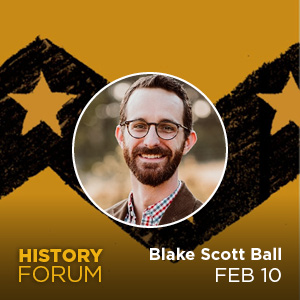
Featured Lectures
MNHS History Forum
Since 2004, History Forum at the Minnesota History Center has explored the richness, expansiveness, and complexity of American history with some of the nation’s best scholars. That tradition continues in 2024 with six events highlighting the diversity and excellence of today’s historical scholarship.
All lectures will take place in the 3M auditorium at the Minnesota History Center.
Lectures are at 10 am (in-person or virtual) and 2 pm (in-person), with live captioning available at 2pm.
- Individual event tickets $16 in-person
- Individual event tickets $12 virtual
March 30 - "13 Clocks: How Race United the Colonies"
with Robert Parkinson
10:00 am in-person tickets
10:00 am virtual tickets
2:00 pm in-person tickets
In his celebrated account of the origins of American unity, John Adams described July 1776 as the moment when thirteen clocks managed to strike at the same time. So how did these American colonies overcome long odds to create a durable union capable of declaring independence from Britain? In this powerful history of the fifteen tense months that culminated in the Declaration of Independence, Robert G. Parkinson provides a troubling answer: racial fear. Tracing the circulation of information in the colonial news systems that linked patriot leaders and average colonists, Parkinson reveals how the system’s participants constructed a compelling drama featuring virtuous men who suddenly found themselves threatened by "ruthless Indians" and defiant slaves acting on behalf of the king.
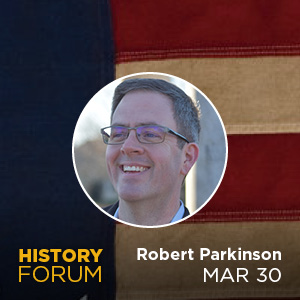
April 20 - "Making America's Public Lands"
with Adam Sowards
10:00 am in-person tickets
10:00 am virtual tickets
2:00 pm in-person tickets
Environmental historian Adam Sowards traces the long history of public lands in the United States from the beginning of the republic to current events. The concept of “public” has always been one of competing visions and values, from homesteaders attempting to realize the ideal of the Jeffersonian republic, to western ranchers using the open range to promote free enterprise, to wilderness activists who see these lands as wild places, free from human encumbrance. Sowards deftly navigates the complex history of nearly 640 million acres of land and its intimate relationship to ongoing debates about our national identity, values, and politics.
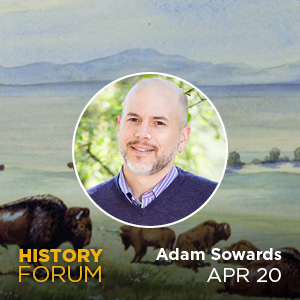
PAST - Nov. 11 - “Franchise: The Golden Arches in Black America"
with Marcia Chatelain
10:00 am in-person tickets
10:00 am virtual tickets
2:00 pm in-person tickets
In Franchise—winner of the 2021 Pulitzer Prize in history—acclaimed historian Marcia Chatelain investigates the complex interrelationship between Black communities and America’s largest, most popular fast food chain. From the first McDonald’s drive-in in San Bernardino to the franchise on Florissant Avenue in Ferguson, Missouri during the summer of 2014, Chatelain shows how fast food is a source of both power—economic and political—and despair for African Americans. Through her innovative research and compelling storytelling, Chatelain shows how fast food is, more than ever before, a key battlefield in the fight for racial justice.
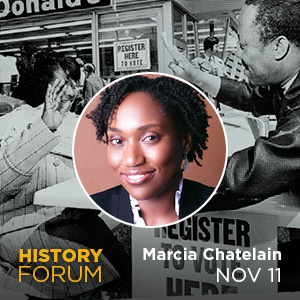
PAST - Dec. 16 - “Muslims of the Heartland"
with Edward E. Curtis
10:00 am in-person tickets
10:00 am virtual tickets
2:00 pm in-person tickets
Edward E. Curtis IV—scholar of Black, Muslim, and Arab American history and life—uncovers the surprising history of Muslim life in the American Midwest through multiple generations of Syrian American families. From the plains of the Dakotas to the factories of Motor City, Curtis’ richly detailed history reveals Muslim Americans at the heart of key American institutions like the assembly line, the family farm, the dance hall, and the public school. This fresh portrayal of a familiar region reveals how, for over a century, Midwestern Syrians have created a life that was Arab, Muslim, and American—all at the same time.
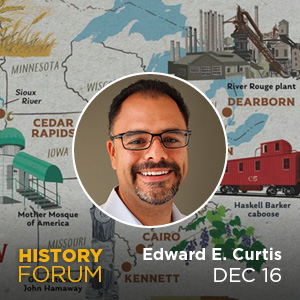
PAST - Jan. 6 - "American Indians & the American Dream"
with Kasey Keeler
10:00 am in-person tickets
10:00 am virtual tickets
2:00 pm in-person tickets
In her groundbreaking history of the urbanization and suburbanization of Native communities in Minnesota, Kasey Keeler shows how American Indians have navigated the intersection of federal Indian policy and federal housing policy to access homeownership, particularly in the suburbs. From the Homestead Act of 1862 to the housing bubble of the early 2000s and today’s Wall of Forgotten Natives, Keeler offers new ways to think about histories of place and placemaking for American Indians here in Minnesota and highlights the contradictions and limits of the ever-alluring “American Dream.”
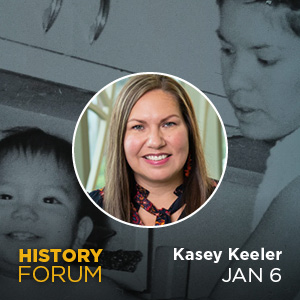
PAST - Feb. 10 - "Charlie Brown's America"
with Blake Scott Ball
10:00 am in-person tickets
10:00 am virtual tickets
2:00 pm in-person tickets
For nearly fifty years, Charles Schulz's Peanuts was a mainstay of American popular culture, with many arguing that it was beloved precisely because it was apolitical in a postwar period of social and political turmoil. Historian Blake Scott Ball challenges that common perception, showing us how Peanuts has always been political. Through fan letters, interviews, and behind-the-scenes documents, Ball reveals how Schulz's beloved comic strip was a daily, decades-long conversation about the rapidly changing politics of his time, including the battles over the Vietnam War, racial integration, feminism, and the future of a nuclear world.
